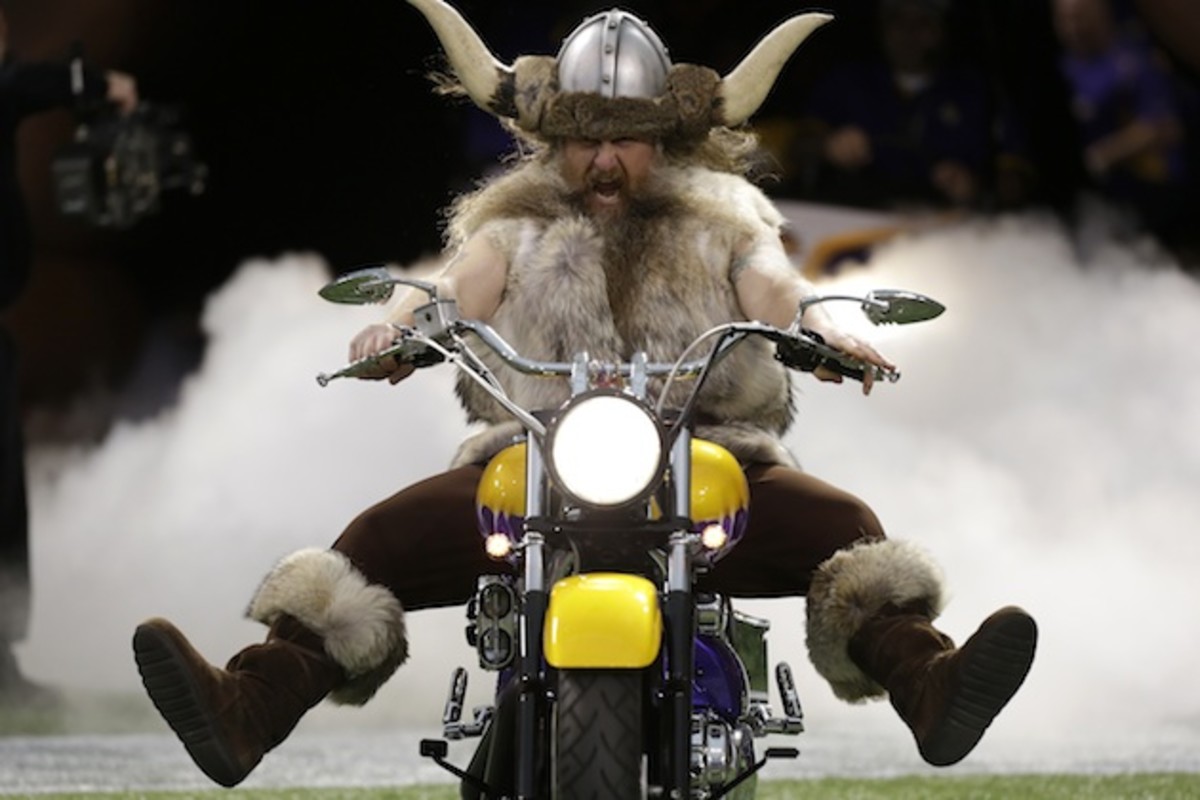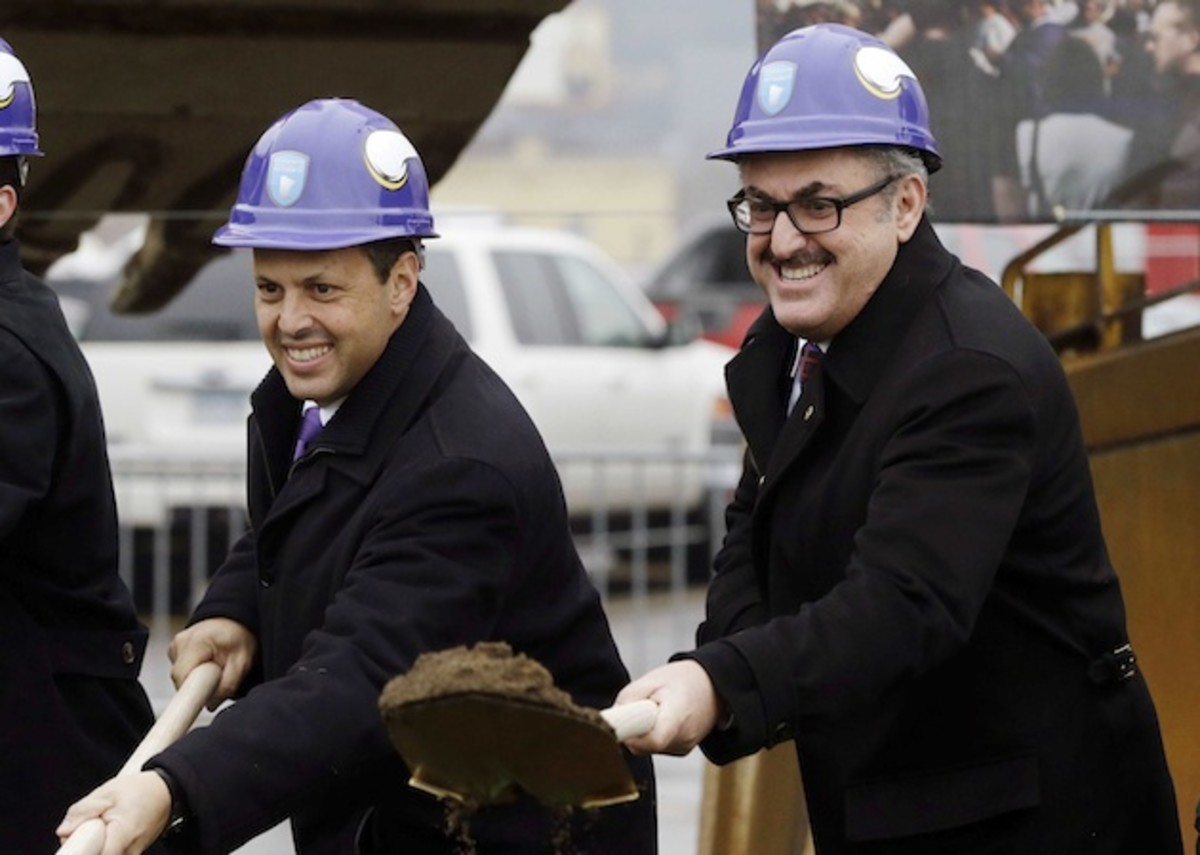Ragnar isn't the only greedy party in Vikings' contract negotiations

Apparently, a horned helmet and a battle axe is no match for modern American capitalism.
Joe Juranitch—better known to Minnesota fans as Ragnar, the bearded, tattooed, motorcycle-riding Viking—wasn’t present for the team’s 31–14 victory on Sunday, despite telling ESPN.com that he still believed he and the team would come to terms on a return to his role as unofficial team mascot.
Vikings defense off to playoff-caliber start ahead of its biggest test yet
The impasse between Ragnar and the Vikings has become one of the more prominent offbeat stories of the young season. It all began when Juranitch, who’s donned those fur-laced boots since 1993, posted a picture to Facebook lamenting the fact that he was stuck at home — “not by my choice” — during the team’s opening game. It was at that point that Ragnar the Viking came under a PR siege on two fronts. Officially, the Vikings released a statement noting that Juranitch’s contract with the team had expired, and that he “has not been able to reach an agreement on his role with the team moving forward.” The team went on to express appreciation for his years of service, indicating he’d be welcome at future ceremonial events.
Michael Rand of the Star-Tribune reported that Juranitch had asked for $20,000 per game from the Vikings as part of a new contract — a substantial raise over the $1,500 he’d been receiving, and a sum that would add up to $1.6 million over the course of the next decade. Suddenly, with one strategic leak, the narrative had been transformed, and Ragnar, that once cherished symbol of rowdy Minnesota fandom, had been exposed as greedy, tone-deaf and out of touch.
By week’s end, Ragnar wasn’t looting or plundering, but rather performing damage control. In the aforementioned interview with ESPN’s Ben Goessling, Juranitch offered his side of the story, explaining that the team had intended from the beginning to “retire” his character, that the $20,000 figure was intended not for a full season schedule, but rather a limited number of appearances, and that this initial proposal was merely meant as a starting point in negotiations. But these discussions never materialized, as the Vikings appeared content instead to walk away from the table altogether and move forward with Viktor, their cartoonish, kid-friendly (and presumably more affordable) “official” mascot instead.
• KING: My top 15 through Week 3 | BEDARD: Time for Flacco to deliver
Of course, severing ties with Juranitch is entirely within the Vikings’ rights. But as this story has made the rounds through newspapers, sports blogs and talk shows, where one man’s career crossroads is suddenly being analyzed from every possible perspective, there’s one question that seems worth asking: Why, exactly, is everyone so eager to take the organization’s side?

It’s easy enough to understand, I suppose, why the world is having a bit of a chuckle at Ragnar’s opening offer. Twenty-thousand dollars for a day spent chanting, cheering, and thundering out of a tunnel? It does seem a bit absurd, especially given how many teachers, nurses and paramedics undertake far more challenging work every day of every year — and for far less reward. So it’s entirely understandable why John Shipley of the Pioneer Presswould write that it’s time for Ragnar to return to the Vikings, “horns in hand.” Or why ProFootballTalk’s Mike Florio would joke that “most think (Ragnar)’s been inhaling too many fumes from that chopper he drove on the field at games.” Or even why why Rob Long, a Baltimore sports radio host, would tee off on Juranitch in a segment unforgivingly titled “The Tragedy of Ragnar The Greedy”:
Timeout. Dude, no one’s coming for you. They may love the bike. They may love the guy dressed in Viking gear, it may be a tradition. You, my friend, you, the person, that’s in that costume, that’s on that bike, you are not the tradition. The tradition is some guy riding out on a bike, dressed in Viking gear. That means, you know what that means? That means you can be replaced. You can be replaced.
Week 3 NFL Hangover: Are the Bengals our last hope to stop the Patriots?
He’s right, of course. Juranitch was, and very much remains, expendable: The team has moved on without him, while with each passing day the conversation becomes a little less about Ragnar, and a little more about a 2–1 team that is gaining momentum and fostering hopes of the playoffs. And who shows up to the stadium to see the mascot anyway? Come to think about it, I can scarcely think of a handful of people less important to the Vikings’ game-day experience.
That would by Zygi, Mark, and Leonard Wilf, of course.
This is the part that never ceases to amaze — the part that always seems to get lost in any conversation about bargaining, ownership, and the value of labor. Because as much as you might find Juranitch’s $20,000 per game figure astonishing, it bears remembering that this pretend Viking wasn’t looking to extract that money from coal miners, ditch diggers, assembly line workers or anyone who punches a clock and sweats profusely for a meager hourly wage. No, the men haggling with Ragnar are worth hundreds of millions, about to open a billion-dollar stadium in Minneapolis and, if you’re inclined to agree with a New Jersey Superior Court Judge, skilled in taking financial advantage of others in order to line their own pockets.
• KLEMKO: At 0–3, Steve Smith Sr. refuses to go down without a fight
But whatever you think of the Wilf family’s merits as owners, it’s important to remember that they are just that: owners. Writers of paychecks, recipients of revenue, keepers of wealth. That, along with watching the games from cushy sky boxes, is the absurdly charmed life of an owner in the National Football League, a position so coveted because — given the still ballooning popularity of the sport — having equity in a team is essentially a license to print money.

Make no mistake, it’s this popularity — this thirst for football, this sheer degree of wealth — that is leveraged by the league’s owners at every opportunity. Deep coffers allow the NFL’s power structure to sustain a work stoppage far longer than the players ever could, leading to a resounding victory in the most recent collective bargaining agreement. As revealed in a series of recent lawsuits, cheerleaders for various NFL teams have been systematically exploited, made to work for effectively less than minimum wage, because, after all, if they’re not interested, they can be replaced quite easily. (Sound familiar?)
Then, of course, there’s the single greatest example of the NFL's weight-throwing approach to power: the great publicly-financed stadium caper. The state of Minnesota has grown quite familiar with this little parlor trick, with with next year marking the official opening of U.S. Bank Stadium, an undoubtedly glorious structure which will soon host the Super Bowl, the Final Four and Wrestlemania. In keeping with tradition, approximately 50% of the new stadium was paid for with public money. Hey, if taxpayers aren’t willing to pony up, there’s always another city ready to roll out the welcome mat. (Just ask fans in Oakland, San Diego and St. Louis.)
Lukewarm Week 3 fantasy football recap: Eddie Lacy disappoints America
This is the game that professional sports owners have played, to the hilt, for decades now, and somehow we refuse to wise up. Reasonable people can disagree on what an NFL mascot is truly worth. But the idea that Joe Juranitch should be ashamed of even asking for more money is the same mentality that leads to players being branded as “spoiled” and “delusional” for not simply living with their millions and keeping quiet. Never mind that they’re the ones actually playing the games, generating the attraction, doing the work and — in more cases than we’re yet prepared to admit — bearing the lifelong physical and psychological consequences. Labor must be kept in check, always, so that capital can get back to the business of, well, collecting the spoils. Say what you will of the man in the pelt—how easy his job is, how frivolous his responsibilities. But at least I can tell you what he brings to an NFL Sunday.
No, Ragnar doesn’t “deserve” or “need” $20,000 per game. And when we found out he asked for it, we all had a good laugh. But then, the team that he works for didn’t “deserve” or “need” $500 million to pay for a stadium. And yet when they asked for it, an entire state opened up their wallets.
So you tell me: Who’s the real pillager?

